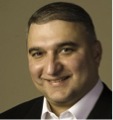
When
6:15 pm to 7:45 pm, April 17, 2014Location
Li Ka Shing Ctr For Learning (LKSC) Room 120291 Campus Drive, Stanford, CA, United States
In this lecture, Dr. Firdaus Dhabhar will discuss his research associated with compassion. This event is an hour-long lecture followed by questions from the audience. Registration is required for access to seating before the event starts. The talk will be recorded and posted to CCARE’s YouTube Channel and website several weeks after the event.
Firdaus Dhabhar is a neuro-immunologist and Associate Professor of Psychiatry & Behavioral Sciences at Stanford University. His laboratory investigates the effects of stress on health. He was the first to show how short-term stress enhances the body’s immune defenses to increase protection during a fight-or-flight response. He has proposed that fight-or-flight stress is generally “good” stress and represents one of Mother Nature’s fundamental but under-appreciated survival systems. His research aims to harness “good” stress to boost immunity during surgery, vaccination, and cancer. In contrast, his laboratory also investigates how long-term stress, or “bad” stress, and disorders like depression, have harmful effects on brain and body.
Working with colleagues at Stanford’s CCARE, UCSF and UC Davis, Dr. Dhabhar has become keenly interested in developing practical and sustainable interventions to minimize “bad” stress and maximize “good” stress, in order to promote health and healing. He believes that activities/interventions (e.g. exercise, meditation, compassion, art, music, dance, etc.) can reduce “bad” stress, optimize good stress, and promote prosocial behavior at the individual and societal levels. Among Dr. Dhabhar’s honors are the Council of Graduate Schools Distinguished Dissertation Award; the PsychoNeuroImmunology Young Investigator Award; and the Richter Award for Excellence in Psychoneuroendocrinology. In addition to numerous highly-cited scientific publications, Dr. Dhabhar’s work has been featured by major media outlets including The New York Times, The Financial Times, USA Today, US News & World Report, Scientific American, ABC News, and others. Dr. Dhabhar loves teaching and working with undergraduate and graduate students in his classroom and laboratory. He also enjoys interacting with diverse audiences and has been invited to make numerous national and international presentations on different facets of his laboratory’s research.
He will speak about Good Stress, Bad Stress, And Health — How Compassion May Help You Stay On The Good Side Of The Stress Spectrum.
